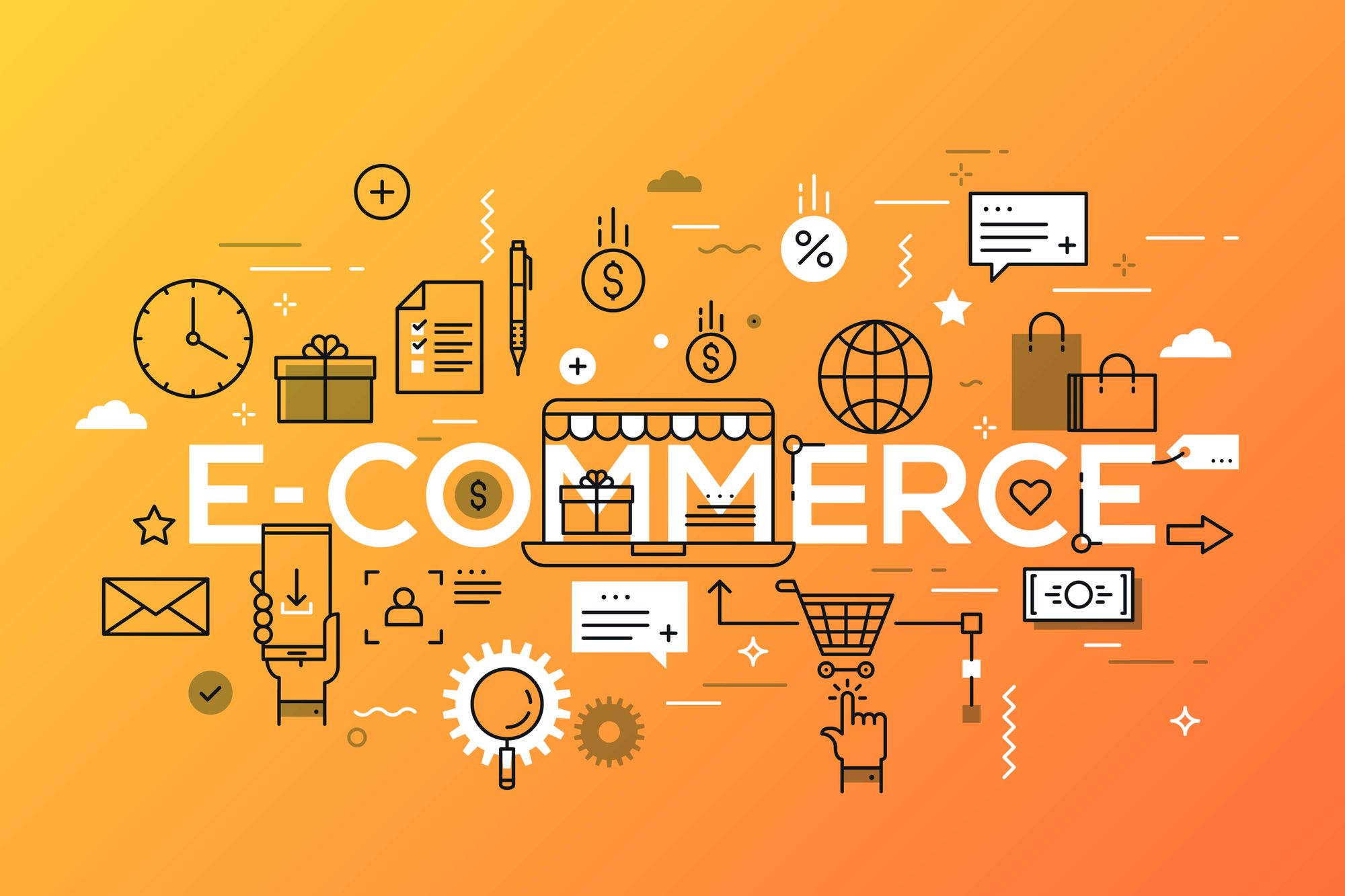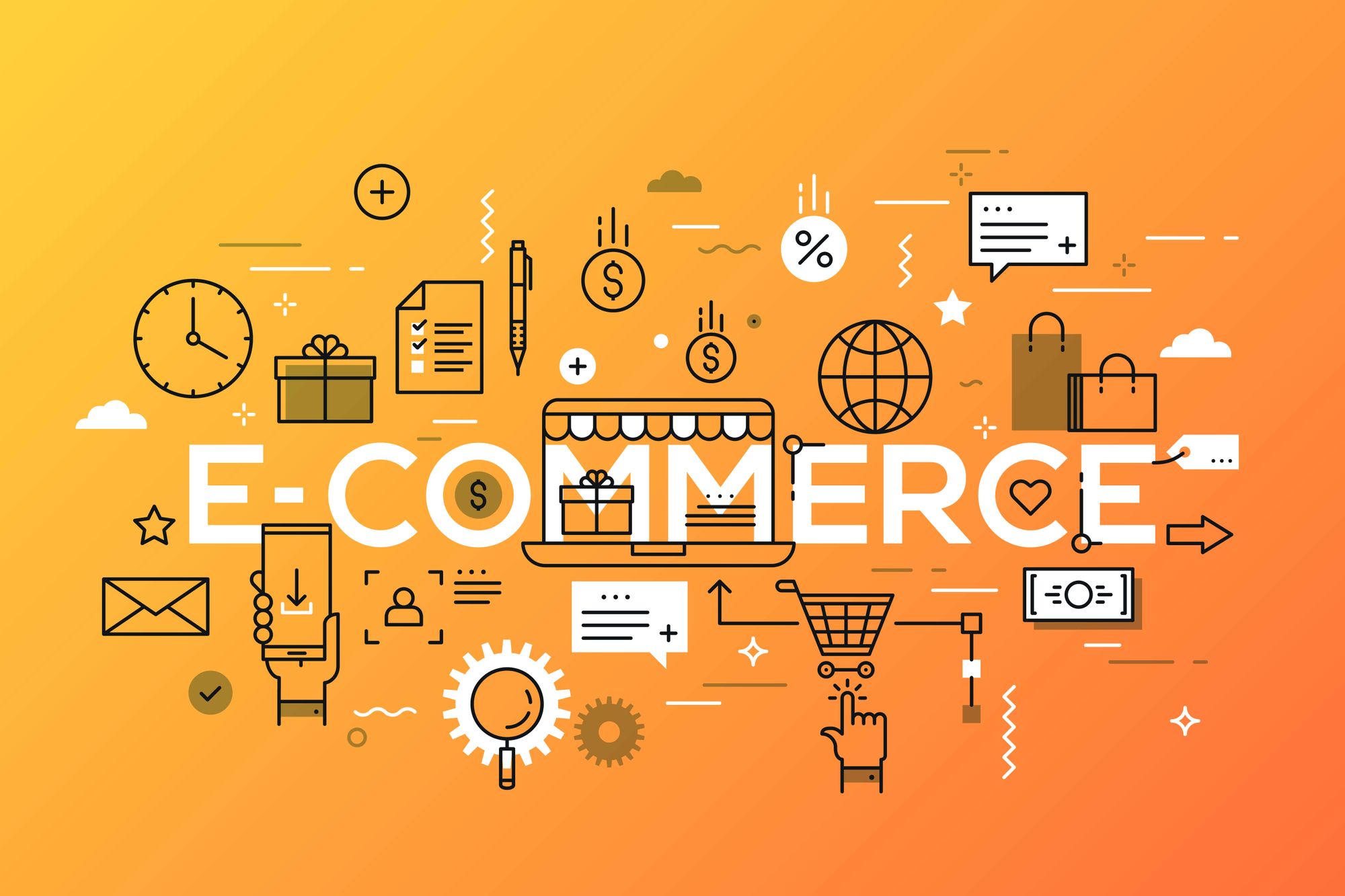
Online shopping is booming in the U.S. A report by Statista's Research Department predicts that the ecommerce market will grow by a whopping 490.4 billion U.S. dollars from 2023 to 2027. What an excellent opportunity for online business owners like you!
However, turning your ecommerce business ideas into an online business is difficult since you must deal with challenges like managing inventory, attracting customers, designing a unique website, and optimizing for search engines. How can you handle these difficulties and run a successful online business? The answer is to use ecommerce management software to streamline every part of your online operations, while also leveraging the expertise of top ecommerce SEO companies to improve your search engine rankings.
This article is what you are looking for in an ecommerce solution, and learn how it can help you grow your online business.
What is Ecommerce Management Software?
Ecommerce software solution is a suite of programs that helps you run and grow your online business. It can help you manage your business while integrating with other apps and allows you to perform additional operations to streamline store management across different channels.
So, what can ecommerce software do for your business?
Create and customize your online store: An ecommerce software helps you design a website that showcases your brand and products in the best possible way without coding or manually installing anything.
Track and manage your inventory and orders seamlessly: Monitoring your stock levels and checking order status, shipment methods, and returns are the key features to optimize inventory processes, operate efficiently, reduce cost, and increase profits for your business.
Inventory management software is a purpose-built solution for retailers who want to grow their sales and streamline their operations across all channels and locations. It helps manage multiple warehouses and prevents overstock and low stock using supplier management, stocktaking, inventory adjustment, and low-stock alerts.
The best courier management tools is a purpose-built solution for businesses aiming to optimize delivery operations and improve customer satisfaction. It simplifies tracking shipments, manages delivery schedules, and ensures real-time updates across all locations. Streamlining processes such as route planning, package tracking, and delivery confirmations minimizes delays and enhances operational efficiency.
Increase customer satisfaction, convenience, and conversion: Providing customers with multiple payment options, such as credit cards, debit cards, and digital wallets, that cater to their customer's preferences, needs, and situations. An ecommerce software also secures transactions, prevents fraud, complies with tax regulations, and generates reports. E-commerce customers have various payment options including credit cards, debit cards, and digital wallets. Digital wallets are projected to account for 54% of global e-commerce payments by 2026. E-commerce software enhances security, prevents fraud, ensures tax compliance, and generates reports. Using a Vpn can further protect these transactions by encrypting sensitive customer information. This ensures that financial and personal data is encrypted and safe from cyber threats. This added layer of security is crucial for maintaining customer trust and safeguarding against potential cyber threats.
Marketing support: Promoting your online business and engaging its target audience to increase brand awareness and reputation, and ultimately grow its sales and revenue with built-in social media marketing programs, email marketing, or SEO to generate more leads and conversions, and enhance their authority and credibility.
For example, Flock offers 24/7 customer support, built-in email campaigns, SEO tools, and analytics with strategies and tactics that can be used for different digital channels and platforms.
Generate reports and analyze business performance: A complete ecommerce software can help online businesses understand their current situation, identify their strengths and weaknesses, and make informed decisions for future improvement using data and insights.
For example, QuickBooks Online Advanced is a popular cloud-based business management solution to help online business control and increase productivity with real time data on KPIs, such as sales, profit margins, revenue, profitability, and cash flow. You can also customize and automate workflows with dashboards, segmentation, attribution, and forecasting features.
By understanding what ecommerce software is and how it works, you will have a general picture of its importance for your online business. Let’s look at our top 5 below to make a better decision.
Top Online Business Management Software To Run Ecommerce Stores
1. A POS System Integrated With Inventory Management Software
A POS system is a vital solution that helps retail business owners process sale transactions, accept multiple payment methods, and manage inventory, order fulfillment, and customer data in physical and online stores. In addition, a complete POS system can easily integrate with other extensions and software, such as marketing tools and accounting software, to run a seamless business operation.
Example:
Magestore POS is an all-in-one retail business management system that can track sale transactions, level of stock, customer information, and products and sync data across channels in real-time.
Key features:
- Sync data in real-time for sales, inventory, and customers across multiple locations and channels, allowing you to stay up-to-date with your business operations.
- Offer efficient inventory management to track stock flow, reorder points, and low-stock alerts. Generating reports for demand forecasting for better decision-making.
- Accept multiple payment options to enhance customer purchasing experience in multi-channels.
- Compatibility with other extensions and devices to add new functions, void technical issues, and provide a smooth operation.
- Work well in offline mode.
- Provide employee reporting and management system: This can help you measure and improve your performance and make informed business decisions.
Pricing: Custom pricing based on:
- The number of stores
- Business requirements
- Support level
- Free first-year support and 90-day money back for a POS license.
- The inventory management is compatible with Magento 2.3.x and 2.4.x versions.
2. Customer Relationship Management (CRM) Software
CRM software aims to handle customer relationships by recording their preferences, behavior, feedback, and loyalty. As online business owners, you can all benefit from CRM with the help of marketing campaigns, customer service, and retention strategies to attract more potential customers, enhance customer satisfaction, improve business performance, and generate business sales and profits.
Key features
Integration: Compatible with many ecommerce platforms and other tools, such as payment processing, analytics, ecommerce email marketing, etc., which help you sync your data in real time and processes across different channels.
Segmentation: Segment your customers based on various criteria, such as demographics, behavior, purchase history, preferences, etc. This will help you create and send targeted messages to your customers and potential customers.
Automation: To save time and effort in sending emails, reminders, notifications, and coupon codes to your customers, CRM software automates these tasks and your workflows while improving your efficiency with live chat, chatbots, self-service portals, case management, and more.
Reporting and analytics: Generating reports and insights, such as sales, revenue, traffic, conversion, retention, and customer satisfaction, to measure and improve business performance and customer relationships.
Scalability: CRM for ecommerce software can scale with your business growth and needs so that you can add more features, users, storage, etc.
Examples
- Salesforce: It offers many features, such as sophisticated workflow automation, enterprise app development, and cloud-based scalability. It is suitable for medium-to-large operations that need a powerful and customizable CRM platform. You can try it for free for 30 days.
- SendPulse CRM: Multichannel marketing automation software centered around CRM with email marketing. Additional channels include social media and messenger chatbots, SMS, and WhatsApp campaigns. Free plan available with 15,000 emails, basic automations, and transactional messages for e-commerce businesses.
- Zoho CRM: It is part of the Zoho platform, which offers various business applications for sales, marketing, collaboration, and productivity. It is ideal for online business owners who want a seamless and affordable CRM solution. You can get a free plan or a 15-day free trial.
- HubSpot CRM: This software combines sales and marketing workflow and website usage analytics. It is great for small-to-medium businesses that want an easy-to-use and scalable CRM tool. You can start with a free plan or a 14-day free trial.
Pricing
- For a small business subscription: around $12/user/month
- Advanced packages for larger enterprises: from $50 to $150/ user/ month
- Premium plans: upwards of $300/user/ month.
3. Project Management Software
Project management is an ecommerce software that allows you to plan, organize, execute, and monitor projects. Running an online business will handle multi-tasking daily, so having a project managing software will help you save time and effort without leaving your seat to ask each staff individually about the ongoing tasks.
Key features
Task management: Create, assign, track, and complete tasks for your project based on tasks' deadlines, priorities, dependencies, and milestones.
Team communication: Keep in touch with team members and stakeholders by sharing files, documents, feedback, and updates for your project to ensure that the team communication is smooth.
Resource management: Manage, allocate, optimize, and track your resources effectively, such as time, budget, staff, equipment, etc.
Risk management: Use project management software that helps you to identify, assess, and mitigate the risks to create contingency plans and backup strategies for your project.
Reporting and analytics: A project management software can generate reports and insights on your project data and performance to measure and improve project outcomes and quality.
Example- Asana: A cloud-based software that offers the best platform for cross-functional work. With a huge integration capability with +200 apps, you and your team can communicate, collaborate, and coordinate work in one place.
- Smartsheet: A low-code project management software that allows you to automate workflows, collaborate with teams, and track progress using various views and visualizations. It suits businesses of all sizes and industries that need a flexible and scalable project management platform.
- X-Booker is a powerful workflow management tool designed for operational efficiency across businesses of all sizes. With features like workflow automation, booking management, task tracking, financial monitoring, and scheduling, it empowers users to automate processes and gain insightful analytics for enhanced organizational performance.
- Celoxis: This project management software focuses on customer-facing teams and projects. It has features such as advanced reporting, resource management, time tracking, invoicing, and client portals. It is perfect for agencies, consultants, and service providers that want to deliver projects on time and budget.
Prices - $19 to $99/month.
Human Resource Software
Human resource software is one of the best ecommerce software that helps you manage your human resources, such as employees, contractors, freelancers, etc. It also allows you to motivate and engage your employees to enhance the productivity and efficiency of workflows.
Key features
Recruitment and hiring process: Help you post job openings, screen and interview candidates, conduct background checks, and onboard new hires. Integrate with your website and social media platforms to attract more candidates.
Centralize all HR information, including leaves, allocations, timesheets, attendances, appraisals, recruitments, and expenses.
Payroll and benefits: Process payroll, calculate taxes, deduct benefits, and issue paychecks to manage employee benefits, such as health insurance, retirement plans, vacation days, etc.
Check performance and development: Set goals, track progress, provide feedback, and conduct employee appraisals. You can also use it to offer your employees training, coaching, and career development opportunities.
Compliance and legal: Comply with your country or region's labor laws and regulations to handle employee disputes, grievances, and lawsuits.
Example
- Rippling
: This software integrates HR, IT, and finance systems in one platform that lets you automate workflows, manage employee data, and set up devices and apps for your workforce. It suits businesses of all sizes and industries that need a unified and streamlined HR solution. - Paychex Flex: This software offers end-to-end online HR management for your business. It helps with hiring, payroll, benefits, compliance, time tracking, and reporting. It is ideal for small-to-medium businesses that need a comprehensive and cloud-based HR system.
Pricing
The price of human resource management can start at $3/user/month and go upward to $1,239 per month. Advanced HR systems cost closer to $688 to $3,500+ per month.
4. Web Design Software
Web design software is ecommerce management software that helps you create and customize your online storefront, layout, and functionality with text, graphics, video, interactive modules, capabilities, and site navigation.
Key features
Easy-to-use navigation system: Develop a user-friendly ecommerce site to improve the search functionality of products and user experience.
Customizable templates or frameworks: Provide ready-made layouts and designs for your website, which you can modify and customize according to your preferences and needs. Save you time and effort in creating your website and ensure its responsiveness and compatibility across different devices.
Integration: Compatible with other software or apps to work effectively and improve business performance, such as social media marketing, inventory management, email marketing, and product reviews…
Marketing support: Built with SEO tools to optimize your site for search visibility, mobile responsiveness, and conversions. Moreover, marketing online businesses and attracting more customers with email campaigns, chatting with visitors, collecting leads, creating coupons, etc.
Example
- WordPress: Create websites using various themes, plugins, and features for blogging, starting an online portfolio, or creating a business website. WordPress is our list's most popular web design software and offers various optimized themes.
- Wix: A cloud-based software solution that allows you to create a website’s appearance, layout, and functionality with various features and capabilities for ecommerce businesses.
-
Appy Pie's AI Website Builder: An innovative, cloud-based platform that leverages artificial intelligence to simplify the creation of your website's design, structure, and features, offering smart solutions and tools tailored for ecommerce ventures.
Pricing
For online businesses: The average price ranges from $30 to $500 per month, depending on the platform, features, and number of products you sell.
Things To Consider Choosing Ecommerce Management Software
Here are the things you should consider when choosing an ecommerce management software:
Business's goals and needs: You should ask yourself what you want to achieve with your online business and what features and capabilities you need for your ecommerce business. These questions can help you narrow your options and choose an ecommerce management software that suits your goals and needs.
Budget and resources: Different ecommerce management software has different pricing plans and fees, such as subscription, license, installation, maintenance, etc. Consider how much money and time you will spend running an online business.
Compatibility: Consider choosing the ecommerce management software that can integrate with your ecommerce platform and other tools, apps, or extensions, such as payment processing, inventory management, analytics, email marketing, marketing tools, etc.
Security: Check how secure and compliant the ecommerce management software is with industry standards and regulations. Ensure it supports robust security measures, such as encrypted data transmission, secure payment gateways, and possibly integration with reputable VPN services and trustworthy antivirus software (check out this McAfee review).
Scalability: Choose an ecommerce software with room to expand its features and customer base as your online business expands by increasing traffic and sales. Consider how many languages the software supports, how simple it is to install, and how many products you can sell without slowing down the store's speed.
Customer support: Each ecommerce software goes along with the help of desks, business VoIP, tutorials, and documentation from the customer support team. In some cases, the ecommerce platform needs frequent updates and maintenance to fix security flaws and keep it running smoothly, so ensure the provider has sufficient customer assistance even when updating software. Effective call management systems can also streamline customer inquiries and enhance overall support efficiency.
Reviews: Consider reviewing on a trusted review website like Trustpilot or Capterra.
Wrap Up
By the end of this article, we hope you have a clear idea about choosing the best ecommerce software if you tend to run an online business. We have explained five critical types of ecommerce management software with their features and suggested the best option available.
Consider your business goal and budget, choosing a suitable ecommerce management software to save time, money, and effort while improving your efficiency, effectiveness, and customer satisfaction. We hope your choice will also grow your online business and achieve your goals faster and easier.








